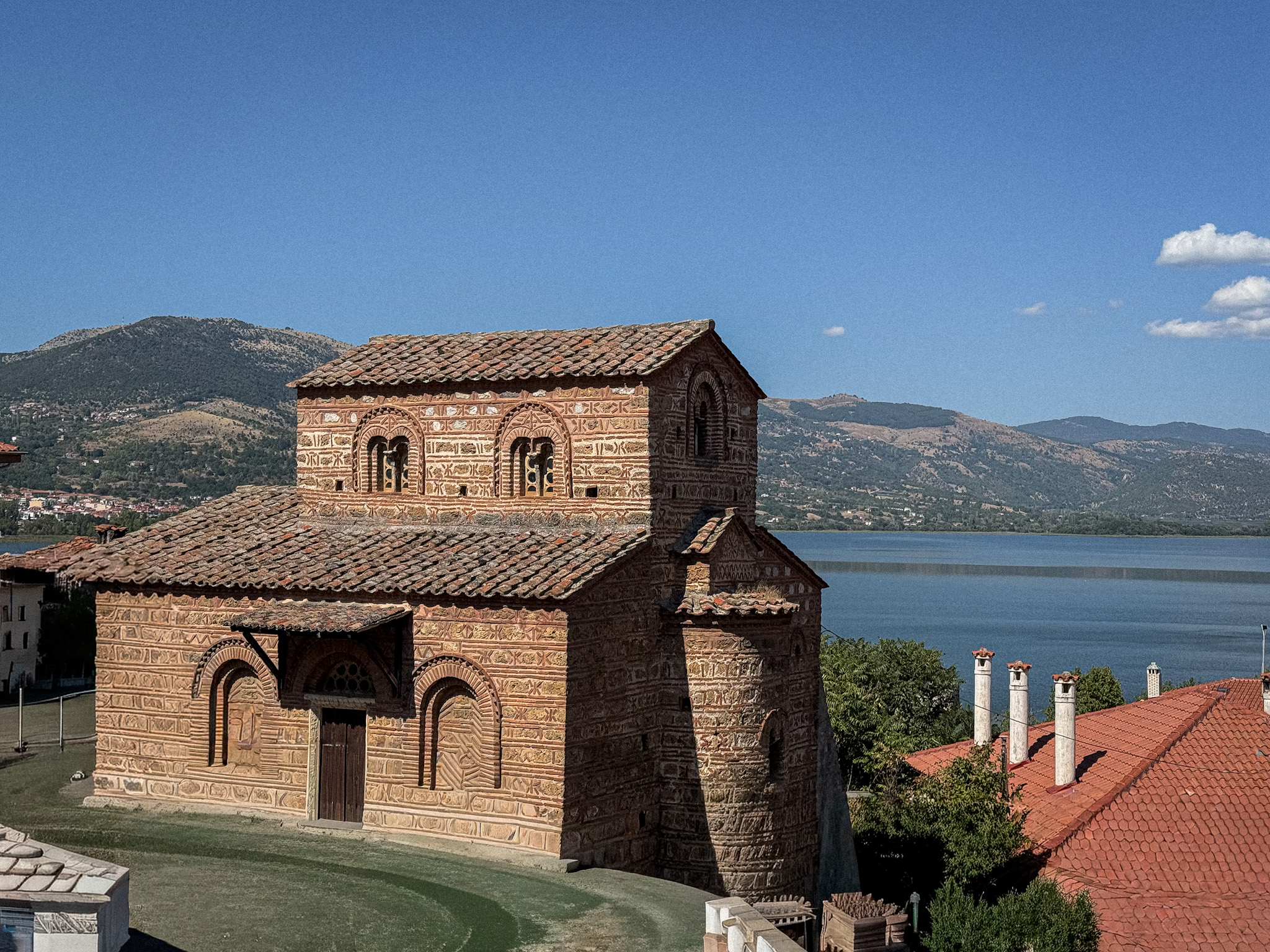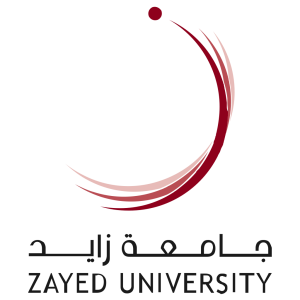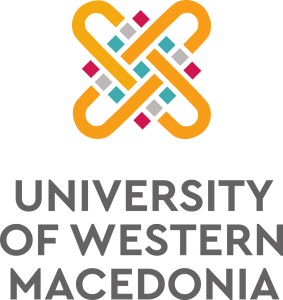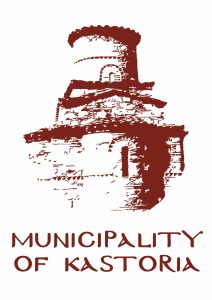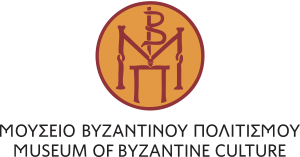Winter School 2026
Taste the past. Digital media for Byzantine heritage and authentic experiences in Northern Greece
7 – 14 February, 2026
Thessaloniki & Kastoria (Greece)
Church of Agioi Anargyroi (10th century), Kastoria, Greece. Photo credit: Eviana Gerousi (2025)
The 2026 edition of USI UNESCO Chair Winter School is organized in collaboration with the Zayed University (United Arab Emirates), the University of Western Macedonia (Greece) and the Institute of Economic Analysis & Entrepreneurship of the University of Macedonia (Greece). It explores both tangible and intangible cultural heritage across two historic cities: Thessaloniki and Kastoria.
Thessaloniki is one of the largest cities in southeastern Europe and the second major economic, industrial, and commercial center in Greece. Founded in 315 BCE and named after the sister of Alexander the Great, the city has long served as a crossroads of civilizations, blending Hellenistic, Roman, Byzantine, and Ottoman influences. A key center of the Byzantine Empire, Thessaloniki has Byzantine monuments of outstanding universal value, many of which are UNESCO World Heritage Sites. Since 2021, Thessaloniki has been a UNESCO city of Gastronomy for its rich food culture with flavours imported from Europe, Africa and the Middle East (https://www.unesco.org/en/creative-cities/thessaloniki).
Kastoria is a city in Northern Greece, situated on the promontory of Lake Orestiada and surrounded by mountains. The lake is designated a Natura 2000 Special Protection Area (SPA) and Site of Community Importance (SCI). These designations highlight the lake’s environmental importance and ecological value, providing a network for protecting rare and endangered species within the European Union. Renowned for its Byzantine and post-Byzantine churches, traditional mansions, and fur industry, Kastoria has a rich blend of natural beauty, religious heritage, and cultural history (https://www.discoverkastoria.gr/en/).
Participants will have the opportunity to:
- Explore the region’s Byzantine art and architectural heritage
- Visit museums and historic mansions that reflect the area’s diverse cultural legacy
- Engage with local music and traditional dance practices
- Discover the area’s distinctive gastronomic culture
- Observe the craftsmanship behind Kastoria’s historic fur industry
The program includes:
- Lectures and discussions with academics, tourism professionals, regional governmental bodies, local entrepreneurs, hotel and restaurant managers and owners
- Site visits to significant cultural and historical landmarks (including three UNESCO World Heritage sites)
- Field experiences designed to deepen cultural understanding
- Hands-on workshops in cuisine, music, dance, and traditional crafts
Goals
- Promote the digital interpretation of Byzantine and local cultural heritage through academic exchange, hands-on activities, and field visits in the cities of Thessaloniki and Kastoria
- Co-develop sustainable tourism strategies by integrating digital technologies, cultural heritage and local traditions, highlighting each city’s unique identity and attracting meaningful visitation
- Support sustainable and tourism development by highlighting Kastoria’s lesser-known yet culturally rich assets, including traditional performances, crafts and gastronomy
- Foster interdisciplinary collaboration among international scholars, students, professionals and local stakeholders across cultural heritage, digital technologies, and tourism studies
Intended Audience
The WinterSchool is aimed at researchers, professionals, and students (Master and PhD) interested in a transdisciplinary approach to heritage, tourism and ICTs with a focus on sustainability and intercultural dialogue.
Organizers
- Filareti Kotsi, professor of Tourism and Cultural Communications, Zayed University, Dubai, United Arab Emirates
- Silvia De Ascaniis, coordinator of USI UNESCO Chair & Lecturer and Researcher at the Institute of Digital Technologies for Communication, Università della Svizzera Italiana (USI), Lugano, Switzerland
- Lorenzo Cantoni, chair-holder of USI UNESCO Chair and director of the Master’s in International Tourism of Università della Svizzera Italiana (USI), Lugano, Switzerland
With the support and sponsorship of the Municipality of Kastoria, represented by its Mayor, Mr. Ioannis Korentsidis.
Field visits
in Thessaloniki:
Byzantine Museum of Culture – The Museum is a leading institution dedicated to preserving and interpreting Byzantine heritage in Northern Greece. Its permanent exhibitions showcase various artefacts, highlighting Byzantine life’s religious, artistic, and social dimensions. It emphasizes Thessaloniki’s historical role as a major center of the Byzantine Empire. https://www.mbp.gr/en/
White Tower – The White Tower is Thessaloniki’s most iconic monument and a symbol of the city’s layered history. Built in the 15th century after the fall of Thessaloniki to the Ottomans in 1430, it served various military and defensive purposes. Today, it houses a museum dedicated to Thessaloniki’s history and exhibitions that trace the city’s transformation from the Roman and Byzantine eras to modern times. https://www.lpth.gr/indexeg.php
Church of Saint Sophia – Built in the late 7th century, Saint Sophia (Holy Wisdom) is one of the city’s most significant Byzantine churches, dating back to the 8th century, and based after Hagia Sophia in Constantinople (later Istanbul). Recognized as a UNESCO World Heritage Site, it features mosaics and architecture reflecting early Byzantine Christianity’s religious and artistic legacy. https://whc.unesco.org/en/list/456/
Church of Saint Demetrius and Crypt – The Church of Agios Dimitrios is recognized as a UNESCO World Heritage Site for its historical and architectural significance. Beneath the basilica lies the crypt- now a museum that displays early Christian artefacts. https://whc.unesco.org/en/list/456/
Arch of Galerius and Rotunda – The Arch of Galerius and the Rotunda are two Roman-Byzantine monuments inscribed on the UNESCO World Heritage List. Built in the early 4th century AD, the Rotunda has gone through multiple periods of use and modifications as a mausoleum, Christian church, and a Muslim mosque. The Arch commemorates Emperor Galerius’s military victories and features relief carvings of imperial triumph. https://whc.unesco.org/en/list/456/
in Kastoria:
Byzantine Museum and a visit to three Byzantine Churches – The Byzantine Museum safeguards a collection of icons from the city’s 72 Byzantine and post-Byzantine churches. Among Kastoria’s most significant monuments are Panagia Koumbelidiki (9th century), Agios Stefanos and Agioi Anargyroi (10th century). https://www.discoverkastoria.gr/en/place/byzantine-museum-of-kastoria/
Monastery of Panagia Mavriotissa – Founded in the 11th century, it is decorated with frescoes in the 12th and 13th centuries. https://www.discoverkastoria.gr/en/place/holy-monastery-of-the-virgin-mary-mavriotissa/
Dragon’s Cave – It is a lakeside cave, featuring underground lakes, chambers, and stalactite formations. It holds paleontological significance due to fossil discoveries, including remains of the prehistoric cave bear. https://spilaiodrakoukast.gr/en/index
Immersive Experiences & Experiential Workshops
Visit a local winery – Kastoria is on the Wine Routes of the Lakes, part of Northern Greece’s Wine Roads. Participants will visit the local Maggel Estate Winery for wine tasting and a guided tour through the vineyards and cellars.
Live Cooking – Participants will join local women in a hands-on cooking class, where they will prepare traditional pita (pie) and invite everyone to participate, sharing stories, techniques, and flavors from Kastoria’s culinary heritage.
Fur workshop (optional) –This field visit will examine Kastoria’s fur-making tradition, where artisans demonstrate craftsmanship techniques passed down through generations. Insights into the cultural and economic significance of fur-making in Kastoria’s history will also be discussed.
Hike around the lake – Participants in a hike around Lake Kastoria will be able to engage with the region’s natural landscape. The accessible 8 km trail accommodates individuals of all fitness levels.
Folklore Dance and Performance – Participants can participate in a Kastorian folklore dance performance and join a dance class, learning traditional steps while experiencing the local culture firsthand.
Speakers
Academic speakers will be joined by a diverse group of professionals, including experts from the tourism and heritage sectors, representatives from municipalities and prefectural governments, experienced tour guides, as well as hotel and restaurant owners, managers, and executives.
Language
The School will be conducted in English, with some activities held in Greek. Translations will be provided.
Price
980 EUR (not refundable)
The program fee includes:
- hotel accommodation in double rooms for seven (7) nights (single rooms are available for an additional supplement of €250)
- all meals during the program
- local transportation
- entrance fees to cultural attractions and workshops
The program fee does not include:
- travel to and from Thessaloniki from your home country
- airport transfer from Thessaloniki Airport to the Hotel on arrival day
- transfer from Kastoria Hotel to Thessaloniki airport on departure day
- extras in hotels (e.g., minibar, laundry, etc.)
- alcoholic beverages
Seminars/Lectures/Presentations/Opening/Closing Ceremonies will be hosted at Vergou Mansion, a traditional mansion built in 1850 (https://www.discoverkastoria.gr/en/place/vergou-mansion/).
How to apply
To apply, please send the following documents to unescochair@usi.ch by Monday, 15th December 2025:
- your Curriculum Vitae (CV)
- a one page motivation letter outlining your interest in the program and its relevance to your academic or professional goals
Partners
